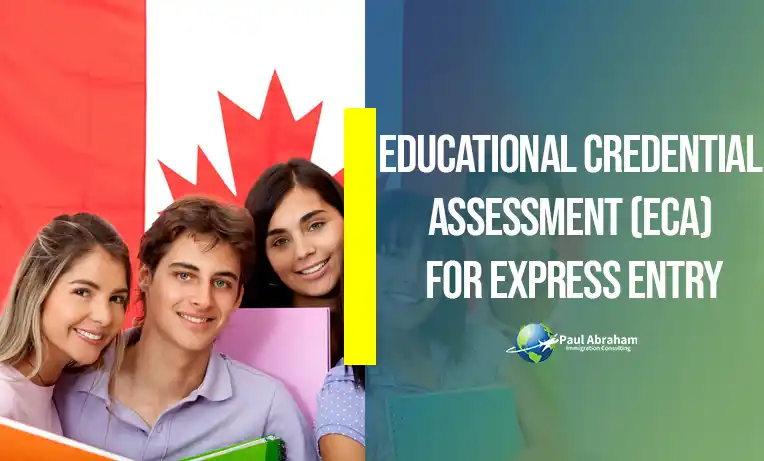Educational Credential Assessment (ECA) For Express Entry

Last Updated On : September 05 , 2023
Author: Mr. Leo Immigration Consultant at PAICThere would be no need for an academic credential evaluation in a just world. However, Canadian officials have no notion whether what you studied in university or college has a Canadian equivalent.
As a result, they must ensure that. And they need to make sure that any certifications or transcripts you have are genuine and not from a bogus university or something you bought off the internet. So, let’s dive deeper into the world of ECA.
What is ECA?
An educational credential assessment (ECA) is often used to ensure whether your foreign degree, diploma, or certification (or other proof of your credential) is genuine and comparable to a Canadian one. ECAs are classified into several categories. For immigration purposes, you must obtain an ECA. If you received another sort of ECA, depending on the type of ECA and issuing body, you may be able to have it re-issued. In your Express Entry profile, you must provide your ECA report and the reference number.
Your ECA report may be helpful when hunting for work. However, it does not guarantee this:
- You will be hired in your field or at a specified level.
- You will be granted a license to practice in a regulated profession (job).
Who Needs ECA?
An Educational Credential Assessment (ECA) determines whether a foreign degree, diploma, or certificate is equivalent in Canada. An ECA, for example, will decide whether a foreign Master’s degree is of the same calibre as a Canadian Master’s degree. You must supply an ECA if your credential was conferred in Canada by a Canadian educational body.
You do not require a minimum education level to qualify for Express Entry for the Federal Skilled Trades (FST) program or the Canadian Experience Class (CEC). However, you can still earn CRS points for any secondary education you received outside of Canada (if you apply for the ECA for your diploma).
Which Credentials to get assessed for ECA?
The documents you’ll need to supply when seeking to move to Canada are determined by the program you’re applying to. An Educational Credential Assessment, or ECA, is a standard document necessary for most federal economic immigration programs, including Express Entry.
If you are eligible for Express Entry through the Federal Skilled Worker Program, you must first obtain an ECA before you may apply to the pool. You do not need an ECA to submit to the pool if you are eligible under the Federal Skilled Trades Program or the Canadian Experience Class. Still, you’ll need one if you want to collect any Comprehensive Ranking System (CRS) points for your schooling.
When To Get An Assessment For 2 Or More Credentials?
Yes, an ECA (Educational Credential Assessment) report is required for both Bachelor’s and Master’s degrees. An Educational Credential Assessment is a review of your degree or diploma to ensure that it perfectly meets Canadian education standards. So, if you have a Bachelor’s and a Master’s degree and want to apply for Express Entry, you’ll need two ECA reports.
Along with your application, you must submit an authentic ECA report. If you desire a seamless voyage, you can get it assessed by an appropriate agency such as WES (World Education Services).When To Get Your Secondary Education Assessed?
In most circumstances, an assessment is only required for your most significant level of schooling. If you hold a Master’s degree, you require an assessment for that degree. You are not required to have one for your Bachelor’s degree. You must complete an evaluation for each credential to earn points for possessing two or more.
To receive full credit for multiple credentials, at least one of the credentials must be for three or more years of study. The order in which you complete your credentials has no bearing on your score. If your post-secondary credential is not equivalent to a Canadian credential, you may be able to have your secondary credential evaluated. This would earn you credit for completing secondary school.
Who can do your assessment? | Designated Organizations
Your evaluation must be performed by an organization or professional body designated by Immigration, Refugees, and Citizenship Canada. They will provide you with a report that will tell you what your education is worth in Canada.
Processing periods and fees may differ depending on the organization or professional body. When you select a recognized organization or a professional body, they will instruct you on how to submit your documents to receive your assessment. Given below are some Designated Professional Bodies:
- International Qualifications Assessment Service (IQAS)
- International Credential Evaluation Service (ICES)
- Comparative Education Service (CES)
- International Credential Assessment Service of Canada (ICAS)
- Pharmacy Examining Board of Canada (PEBC)
- Medical Council of Canada (MCC)
- World Education Services – WES
Conclusion:
A Canadian educational credential and work experience guarantee that an Express Entry applicant will gain important additional points towards their comprehensive ranking framework (CRS) score. You are making them more competitive among other applicants for gaining permanent resident status!
Our RCIC, Mr. Paul Abraham, has been a player in this particular aspect. Thus, he is the best person to guide you through the entire process. The PAIC team takes care of your immigration application from scratch till the end. Please visit our website for better guidance.
